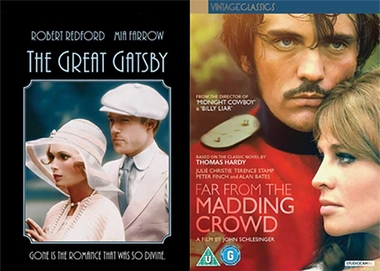Vick's Picks

by Vick Silkenpen
Indie Film Critic
There are many movies involving the subject and meaning of love. Love can be old and love can be new. Some say love is better the second time around while others claim it is the third or more. In many cases, we don't want to choose which is best. Here are two titles delving into love which also have remakes.
The Great Gatsby - If you count the made-for-TV version, this film has been made six times. If you want to view versions that closely follow the F. Scott Fitzgerald novel, the choice really boils down to the 1974 Jack Clayton version or the 2013 Baz Luhrmann 3D version.
Both used scripts that were fairly faithful to the book about the quixotic Jay Gatsby attempting to win back the lost love of past debutante Daisy Buchanan while set in the decadent excesses of a Roaring Twenties summer when it wasn't sex, drugs and rock 'n' roll yet but instead sex, booze, and jazz.
Both versions deliver clear warnings about where obsessive lusts for the American Dream can lead but I seem to be most haunted by the '74 film because Robert Redford's performance as Gatsby has an idealistic and longing quality that sticks with you many years after an initial viewing. Leonardo DiCaprio brought his own qualities to the Gatsby role in the lavish 2013 film but it just doesn't gel as well as Redford's.
With each viewing of the '74 version directed by Clayton, I get a progressively deeper sense of the meaning of poignant love.
Far From The Madding Crowd - It is brave to do a remake of the 1874 Thomas Hardy pastoral novel especially after director John Schlesinger used such a 1960's stellar cast in the 1967 film. There is also a 1915 silent version, a 1998 TV version, and even a 2010 contemporary comedy version so when director Thomas Vinterberg did his 2015 release it must have been a bit daunting.
Schlesinger used the amazing Julie Christie as the independent Bathsheba Everdene who inherits her uncle's farm in Victorian England and has three different men orbiting for her love: Alan Bates is the sturdy sheep farmer Gabriel Oak, Peter Finch is the older and richer William Boldwood, and Terence Stamp is the dashing Sgt. Frank Troy.
Vinterberg's new version successfully uses Carey Mulligan as the headstrong Bathsheba who misses opportunities for happiness with Gabriel played by the quietly smoldering Matthias Schoenaerts. Michael Sheen evokes empathy as Boldwood and Tom Sturridge as Sgt. Troy handles the provocative "sword" scene well. However, Stamp storms his role as Troy so totally in the '67 version that it can never be topped and the sparks that fly between Christie and Stamp are obvious (they actually did off-screen also).
Bates is a more strident Gabriel which combats Christie's haughtiness. The more lyrical and sweeping Schlesinger version is sealed as the most romantic every time Christie gazes into the camera with those blue eyes which seem to provide the skies for the earthiness of the cinematography.





